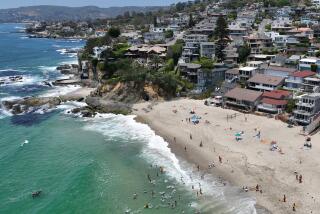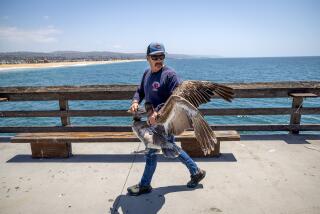Volunteers Turn Concerns to Trying to Save Stricken Birds : Ecology: Administering to the needs of the wildlife is the only activity that the public is allowed to participate in so far in the cleanup efforts.
- Share via
Like many other concerned residents, Chris Dennis has been calling the Huntington Beach city offices and going by the beach daily to see how she could help in the oil spill cleanup effort.
Finally, after a brief training session Sunday morning, she and 44 other volunteers were allowed on the beach to search for oily birds. Later in the afternoon, she and more than 200 others continued the efforts.
“This is the only activity so far that the public is being allowed to participate in,” said Victor Leipzig, former president of Amigos de Bolsa Chica, a 2,000-member environmental organization, and a Huntington Beach planning commissioner.
Leipzig led two training classes on the lawn near the city lifeguard headquarters on Sunday, teaching the volunteers how to rescue the birds while avoiding the toxic oil washing ashore. The training program is mandatory for those who want to help birds stricken by the oil spill.
Those who completed the half-hour session were issued clear plastic goggles, green rubber gloves, orange caps, cardboard boxes with rags and towels and high rubber boots.
They broke into teams of four or five and combed the beach from the Santa Ana River estuary to the Orange County line, about a 12-mile area. Because of possible health risks, volunteers are not being used for beach cleaning and are not allowed to go beyond the berm onto the wet sand unless they spot an injured bird.
Brian Connolly, 16, and Sean Tully, 15, both of Huntington Beach, were among the volunteers who searched for injured or dead birds on Sunday. They also went out with a group of 68 trained volunteers on Saturday night.
“We were out here all day yesterday (Saturday),” Connolly said. “We just wanted to help.”
The first group of volunteers on Sunday found no birds stricken by the oil, although some birds bobbed on an ominous slick on the horizon.
“The birds are out there,” said Shirley Dettloff, president of Amigos de Bolsa Chica. “Whether some of them have just died and not come in yet, we have not determined yet.”
Greg Gallaugher, a Tustin computer programmer and student, went to help Sunday because he is an avid bird watcher.
“Some of them look pretty dirty and oily, but they’re all alert,” he said, pointing to a group of sea gulls scavenging through the sand for food.
Leipzig instructed the volunteers not to go after stricken birds that are still alert and try to run or fly away.
He showed them how to wrap an injured bird in a towel or rag, making sure its eyes are covered, picking it up gently, and holding it away from their faces.
Volunteers were told to take the birds back to the lifeguard headquarters or to the bird rescue center at Magnolia Street.
“I hope something good will come from this. I think that’s what’s keeping everyone going,” Dennis, a 34-year-old bookkeeper, said as she trudged through the sand. “Maybe when it quiets down, everyone will forget about it. I hope not.”
Even as volunteers combed the beach in their protective gear, residents continued to flock to the beach. Most stayed on the bicycle path, but some ventured onto the sand, ignoring the “beach closed” signs and the hum of helicopters overhead.
“I just came down because I was concerned,” said Betty Jaurequi as she wiggled her bare toes in the sand and stared at the crippled oil tanker in the distance.
“Nobody wants to hear that the beach is closed,” Dennis said. “They feel like it’s their beach and they should be able to help or look.”
The volunteer training classes, which are sponsored jointly by the city, Amigos de Bolsa Chica and the state Department of Fish and Game, will continue indefinitely.
More to Read
Sign up for Essential California
The most important California stories and recommendations in your inbox every morning.
You may occasionally receive promotional content from the Los Angeles Times.










